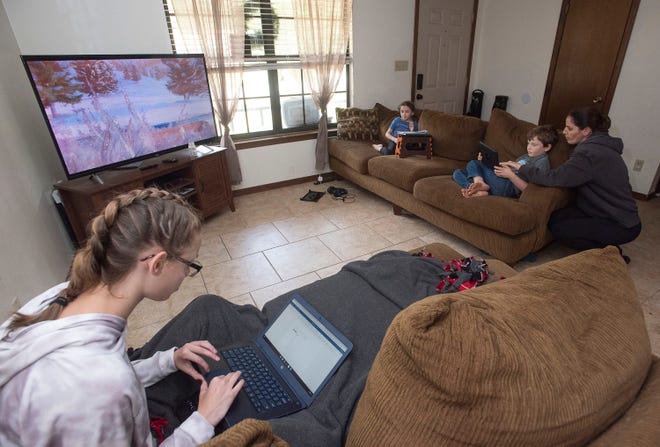
Dr. Leslie Pelinka and Dr. Benjamin Bock

Like many parents, we are looking at the rapidly approaching school year with uncertainty and apprehension, wondering what it all might mean for our school-aged children and ourselves.
As local school districts have moved toward distance learning as a measure to keep the curve of COVID-19 flat and safe in our community, we are all wondering what we can do to get this new and unusual school year off to a good start.
Below are some recommendations. Every family situation is different, and priorities will vary. Please be forgiving of yourselves and as patient as possible with your children as you work to create a game plan.
Create structure
Most kids thrive within a framework.
Learn about your specific school schedule and how to align with it in your home. Every child should be part of the “synchronous” (live) learning sessions with teachers. Many schedules now are posted on the school and district websites.
Start setting the morning alarm. Move wake time 15 minutes earlier every two to three days until the alarm is set in time to be ready to start school in mid-September.
Establish a weekday schedule with designated times for learning sessions, study, meals and breaks for physical activity. Check in with your kids to ensure they are following the schedule.
Limit screen time. The recommendation is no more than two hours of non-school-related screen time. Don’t let screens replace activities like sleep, exercise and live socializing. Try instituting at least one “screen-free” meal each day, and encourage a halt to screen time one hour before bedtime. Consider having your children turn in their devices to you at that time. And model healthy screen use yourself by setting similar limits.
Help your kids stay socially connected
Encourage the use of online platforms for video chats with friends, teachers and family. Sometimes this is the best or only option. The meetings can feel stiff and awkward at first, but the more we all use these platforms, the more comfortable they’ll feel, and the more effective they’ll be.
Unless there are high-risk considerations for your family, encourage small, safe gatherings with a few friends. If you can ensure social distancing, masking and hand hygiene, having children socialize in person is a good idea. Children need to continue social development and maintain social skills for happy, healthy relationships.

Watch for emotional red flags
Talk with your child openly and often, and if you see any of these signs, consider counseling:
- Unusual changes in mood, ongoing irritability, feelings of hopelessness or rage, frequent conflicts with friends and family.
- Changes in behavior, such as withdrawing from friends or a lack of interest in activities previously enjoyed. If your child can’t think of anything to do that sounds interesting or exciting to them, that could be cause for concern.
- Difficulty falling or staying asleep, or sleeping way more than usual.
- Changes in weight or eating patterns.
- Problems with memory, thinking or concentration.
- Changes in appearance, such as lack of basic personal hygiene that goes beyond what might be considered normal in our current situation.
- An increase in risky or reckless behaviors, such as using drugs or alcohol.
- Thoughts or conversation about death or suicide (even hints, like “being gone”).
Attend to your own emotional health
The way you approach a challenge like this can greatly influence your child.
Set the emotional tone by focusing on the positive and what you can control. Regular activities like exercise, spending time outside and making healthy meals keep you at your emotional best when your family needs you. Build time for yourself into school and work schedules.
Let your kids know you are still in charge. Children will be looking to you for leadership. If you clearly set the schedules, rules and boundaries of your school days, generally children will feel more secure and respond positively.
If you feel like you need help, please ask for it. Reach out to family and friends, or find a professional counselor of your own. This effort is worth it for your own happiness and for that of your entire family.
Leslie Pelinka, MD, is a PeaceHealth Medical Group pediatrician, and Benjamin Bock, PhD, is a clinical psychologist at PHMG Children and Family Behavioral Health Services. PeaceHealth, based in Vancouver, Wash., is a not-for-profit Catholic health system offering care to communities in Oregon, Washington and Alaska. For more ways to stay your healthiest go to www.peacehealth.org/healthyyou.